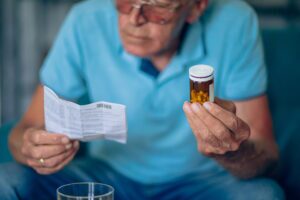Medical review by: Jennie Stanford, MD, FAAFP, DipABOM
Summary:
- Masturbation does not lead to erectile dysfunction (ED). This common misconception has been debunked by several scientific studies—masturbation is a natural and healthy human activity.
- There are proven benefits to masturbation. It can enhance your mood, improve your sleep quality, and even support prostate health. Psychologically, it’s also a great stress reliever and can play a role in healing from sexual trauma.
- Erectile dysfunction is more often linked to physical factors like age and chronic health conditions, as well as psychological factors such as anxiety, depression, and relationship satisfaction. Recognizing these real causes is key to addressing ED effectively.
- Knowing that masturbation isn’t a culprit in ED allows you to focus on effective solutions like medications, including Viagra® and Cialis®, and seeking advice from medical professionals for personalized care and treatment options. Lemonaid Health’s online medical team can provide personalized advice and useful resources.
The masturbation myth
It’s estimated that 52% of all men experience erectile dysfunction (ED) at some point in their lives. Since this condition is so widespread, it makes sense to wonder if common behaviors—like masturbation—can play a role in causing it.
However, there are many myths about masturbation and the notion that it causes ED is one of them. If you’re worried about ED, it’s better to examine the real factors that contribute to it (and what you can do about them). Below, our team of US-based medical professionals looks at the impacts of masturbation on sexual health and the potential solutions available if ED is affecting your life.
Masturbation & sexual health
Masturbation is a natural behavior in many animals, including humans—but there is a wide variety of beliefs about the practice, and not all of them are backed up by evidence.
However, masturbation can have an impact on your physical, mental, and sexual well-being. Below, we look at what masturbation does (and doesn’t) do for you.
The physiological effects of masturbation
- Enhances Mood: Masturbation releases endorphins and dopamine, natural substances that make you feel happier and more relaxed.
- Boosts Immune System Function: Some studies suggest that the release of hormones during orgasm can boost the immune system.
- Prostate Health: Regular ejaculation, whether through masturbation or intercourse, might lower the risk of prostate cancer.
Additionally, masturbating represents a way for people to learn about their own bodies and sexual needs without the risks associated with partnered sex, such as sexually transmitted infections.
Common masturbation myths
The following claims represent popular beliefs about masturbation throughout different time periods and cultures—however, no scientific evidence exists to support any of them.
- Masturbation leads to erectile dysfunction: masturbation does not cause ED. We’ll get into the science behind this one below.
- Masturbation causes blindness: an old myth suggests that masturbation leads to blindness. There is no scientific basis for this claim.
- Masturbation results in infertility: some believe that masturbation affects fertility or leads to infertility. This is false; masturbation does not impact the quantity or quality of sperm.
- Masturbation stunts growth: the myth that masturbation can stunt growth in adolescents is entirely unfounded.
- Masturbation leads to mental illness: there is a misconception that masturbation can cause mental health issues. This is not supported by scientific evidence.
- Masturbation decreases sexual stamina: it’s often claimed that masturbation can decrease sexual stamina or performance. In reality, masturbation has not been linked to sexual performance.
- Masturbation causes acne: a common myth especially among teenagers is that masturbation leads to acne. There is no direct correlation between masturbation and the development of acne.
Masturbation & erectile dysfunction
So if masturbating doesn’t cause ED, why is it such a common misconception? Let’s take a closer look:
Where the myth comes from
Numerous studies have hypothesized that excessive masturbation can make arousal more difficult during partnered sex by reducing relationship satisfaction—but their results have frequently been inconsistent or based on incomplete data. However, this has led to a popular belief (widely circulated in and reinforced by certain online communities) that abstaining from masturbation can somehow increase male “vitality”.
What the evidence says
A study published in the International Journal of Impotence Research found that masturbation frequency was only weakly and inconsistently related to erectile function in men. Another study in the Journal of Sexual Medicine found little evidence that using pornography contributed to male sexual health disturbances of any kind.
Other common causes of ED
So if masturbation doesn’t cause erectile dysfunction, what are the most common contributing factors for ED? Here’s what the same research says about why men typically experience ED (and what can be done):
Physical factors
- Age: The risk of ED increases with age, often due to decreased testosterone levels and other age-related physiological changes.
- Atypical hormone levels: many men who experience ED have low levels of cGMP—a hormone that is essential for facilitating blood flow to the muscles in the penis during arousal. Medications like Viagra® and Cialis® can help by inhibiting PDE5 (a naturally-occurring enzyme that causes cGMP to break down).
- Other chronic medical conditions: conditions like diabetes, high blood pressure, and heart disease can contribute to the development of ED.
Psychological factors
- Anxiety or depression: not only can anxiety and depression significantly affect sexual function and lead to ED—but ED can also cause depression, creating a kind of positive feedback loop.
- Low sexual interest: factors like stress, fatigue, and hormonal imbalances can lead to decreased libido, which may be mistaken for ED.
- Low relationship satisfaction: issues within a relationship, such as lack of emotional intimacy or unresolved conflicts, can impact sexual function and make sustaining an erection more difficult.
Solving ED & creating healthy sexual habits
Medications like Viagra® and Cialis® can make it easier for men to experience erections during sexual arousal. While these medications will not automatically cause erections, they can address some of the underlying medical factors behind ED and make it easier to achieve erections when sexually stimulated. Note that Viagra® and Cialis® are different drugs with unique risk factors and intended usage.
Learn more: is 20mg of Cialis® the same as 100mg of Viagra®?












